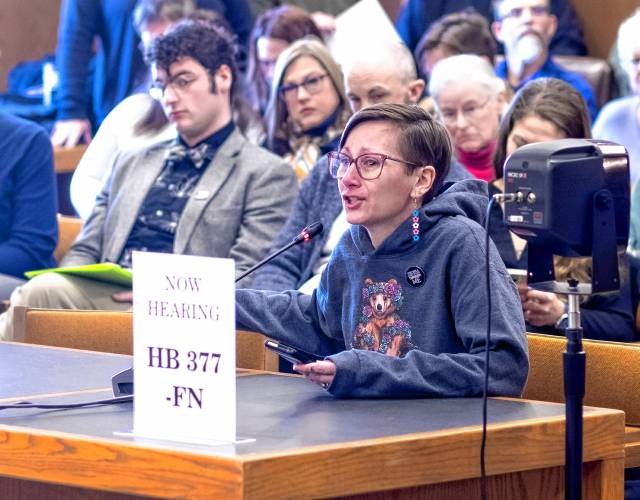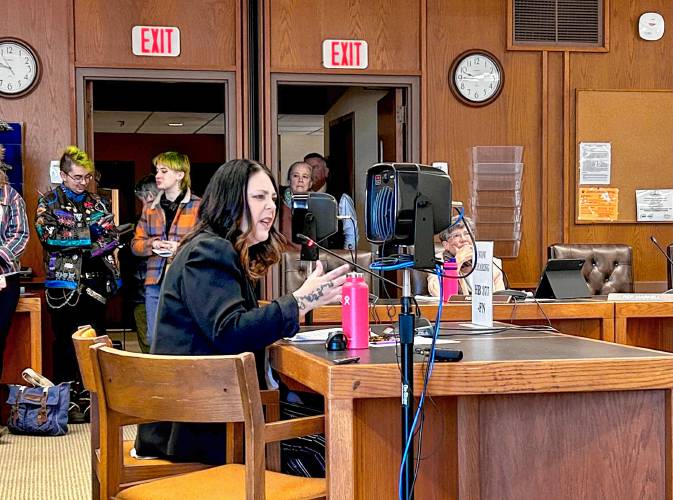House bill to ban gender-affirming treatments for minors draws 4 hours of emotional testimony, national advocates
| Published: 03-03-2025 7:00 PM |
Rosie Emrich spent the weekend mulling over what she wanted to tell lawmakers on Monday.
For her third time testifying at the New Hampshire State House against transgender-related legislation in recent weeks, she was ready to oppose House Bill 377, which would ban puberty blockers and hormone therapy for minors. This time, though, something snapped for Emrich, a mom from Hooksett whose 8-year-old child is transgender.
She began to cry as she testified, telling members of the House Health, Human Services and Elderly Affairs Committee that she’s tired of coming to Concord to defend this issue.
“This is painful. I am tired, I am scared and I don’t want to do this anymore,” Emrich said through tears.
She went on to plead with lawmakers to leave children’s medical decisions up to their families and their doctors.
Others argued that minors shouldn’t be allowed to receive potentially unchangeable treatments that they might regret later, even if the adults around them think it’s a good idea at the time.
“Children cannot fully comprehend the lifelong implications of altering their bodies with powerful medications,” said Rep. Lisa Mazur, a Republican representing Weare and Goffstown who sponsored the bill. “While I understand that gender dysphoria is real and painful, rushing minors into irreversible medical interventions is not the answer.”
Mazur’s bill would make it a class B felony for anyone to supply children with hormone medication or puberty blockers, which some transgender kids take to avoid undergoing a puberty process that doesn’t align with their gender.
Article continues after...
Yesterday's Most Read Articles
Some who supported HB 377 cited anecdotes of people who thought they were transgender, then grew up to regret their decision to medically transition. They also alleged that some children may be pressured into thinking they’re transgender and rushed into treatment, to which several transgender people said has not been their experience. Some said it took years for them to receive that care.
While some public hearings result in little questioning from lawmakers, the committee members on Monday repeatedly inquired about the experiences of people who testified and about the data surrounding potential harms and regret rates.
Emrich worried that her testimony fell on deaf ears.
“It doesn’t feel like anything that I say is actually going to change anybody’s mind,” she said.
That didn’t stop her, or dozens of others, from sharing their stories. The hearing, which lasted over four hours, saw a range of perspectives.
Rep. Erica Layon, a Republican from Derry, said medical practices should sometimes be questioned. She referred back to the Tuskegee experiment, where Black men with syphilis went untreated.
“That was a tragedy and a disaster that was endorsed by the medical establishment,” Layon said. “Sometimes doctors don’t get things right.”
She said she wants to protect young people from making a mistake and, like others, warned that puberty blockers can lead to problems with bone density later in life. Layon, an economist, said she expects to see more hip fractures and other bone issues crop up in people who’ve taken puberty blockers, though she didn’t cite a study.
“People with gender confusion are wonderful people that need to be supported, and you need to make sure that people aren’t blinding themselves with kindness to the scientific data,” Layon said.
Simon Amaya Price, a 20-year-old who recently graduated from Berklee College of Music in Boston, said for three years he thought he was a girl. He remembers being in the room at age 14 when the doctor asked his unaccepting father, “Would you like a dead son or a living daughter?”
The line is used to “manipulate” parents into letting their children get gender-affirming care, Amaya Price said. His dad wouldn’t budge, though, and Amaya Price said he’s glad he didn’t.
“The other side believes that if you don’t give trans-identified kids puberty blockers, cross-sex hormones and surgeries they will kill themselves. That is a damned lie,” Amaya Price said. I am living proof of that fact. I was not put on hormones, I was not operated on, and I’ve grown up to be a healthy and happy 20-year-old man.”
Luke Boisvert, a teenage transgender boy from Nashua, asked his mom, Jenny, to take him to Concord to testify. They sat together, explaining Luke’s unique medical situation. He has Turner syndrome, meaning some DNA is missing from one of his X chromosomes. Jenny said they always knew he’d need hormone therapy to undergo puberty – they just want control over which hormones he takes.
“I would prefer to take testosterone, of course, because it fits what I want to look like, sound like, feel like and who I am: a boy,” Luke said. He could take estrogen but said he’d feel “very uncomfortable” doing so.
When asked about potential regret down the line, Luke said if he did change his mind it’d be “nice” to have the option. But he’s felt this way for five years – since he was 9 – and said his mind is “set in stone.”
Jenny said they’ve been planning her son’s testosterone treatment for years now, but the therapy’s uncertain future in the state could jeopardize that.
“The political climate and people trying to legislate this is getting in the way of his best care and treatment,” Jenny said.
The Legislature has heard public testimony on at least half a dozen bills regarding transgender rights in recent weeks. In addition to HB 377, Mazur also proposed House Bill 712 on Monday, which would ban elective breast surgery for minors, including for gender-affirming purposes. Another law passed last year prohibits genital gender reassignment surgery for people under 18.
Last week, House Republicans introduced House Bill 148, a retry of a bill vetoed by Chris Sununu last year that would allow schools and other facilities to require people to use the bathroom that corresponds with their sex assigned at birth. House Bill 10, also heard last week, would establish a parental bill of rights. Both were championed by some parents and raised alarms for LGBTQ advocates.
Emrich, who testified against the bathroom bill, too, said she’s tired of transgender issues being the hot topic in the Legislature. She’d rather focus on the housing market, tax rates and the cost of living. Based on the online testimony, she said, she doesn’t think that many people in New Hampshire really care about whether her child gets puberty blockers. (As of 3:30 p.m. on Monday, more than 1,400 people had written in opposition to HB 377, and about 100 people had supported it.)
“It’s frustrating at times, I think, to feel like the issues that I really care about, that other people care about, are not being talked about,” Emrich said. “This is the biggest thing.”
Charlotte Matherly is the statehouse reporter for the Concord Monitor and Monadnock Ledger-Transcript in partnership with Report for America. Follow her on X at @charmatherly, subscribe to her Capital Beat newsletter and send her an email at cmatherly@cmonitor.com.










 Henniker ponders what is a ‘need’ and what is a ‘want’
Henniker ponders what is a ‘need’ and what is a ‘want’ Boscawen residents vote to fund major renovation of public works building
Boscawen residents vote to fund major renovation of public works building ‘Voting our wallets’: Loudon residents vote overwhelmingly against $1.7M bond for new fire truck
‘Voting our wallets’: Loudon residents vote overwhelmingly against $1.7M bond for new fire truck In Pembroke, Education Freedom Accounts draw debate, voters pass budget
In Pembroke, Education Freedom Accounts draw debate, voters pass budget
